'assemble/dissemble' is the title of the digital album that is a companion to the collaborative 'December 2020 Report', a "dictaphone assemblage" that was created by Hal McGee from the collection of sounds that 2 Harolds recorded during the month December 2020: Hal did so in Gainesville, Florida, and me in Montreuil/Paris, France. [The following write-up is a january 2021 sketch, that still is looking for its definite form. If ever it gets one, you'll find it here. In due time.]
20 min read 🤓
assemble/dissemble
january 30, 2021 - ...
"... I cook all that's random in my pot ..."
( ° )
December 2020
The AntiVirus 101 placard that Erik Minkkinen (in close collaboration with radio collective Pi-Node) organised for 72 hours, from December 30th to January 1st, leading us over into a new year, was one of the few true lights in the dark last month that ended sort of the darkish, to say the least, 2020. And it was a true pleasure to be able to go over to La Générale to participate. Sort of obvious also to use the recordings that all through the month I had been making for Hal McGee's collaborative December 2020 Assemblage.
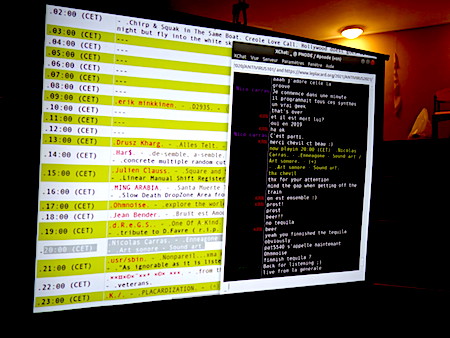
|
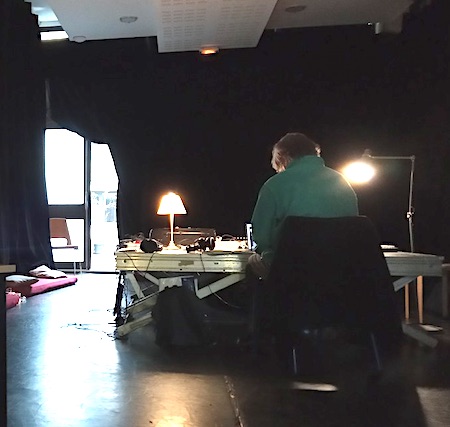
|
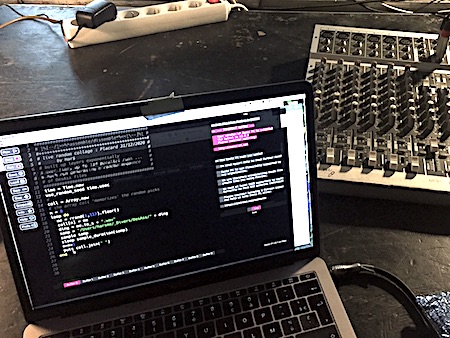
|
Pics at the Antivirus 101 Placard, in the afternoon of December 31st 2020, La Générale Nord-Est Paris XIV |
In the spirit of Hal's assemblages, I performed as my Placard 101 set a multi layered random walk through the set of my December recordings. Not using shuffle play on a set of three or four digital dictaphones, but with a simple script in Sonic Pi.
Many (equivalent) ways to do that, but here is one (the scripting language used by Sonic Pi is Ruby):
#========================================== # Har$, december 2020, Placard 101 # permutation-play of Har$ files # # shuffles playlist, and then plays it #========================================= time = Time.new use_random_seed time.usec colla = Array.new n = 0 while n < 118 colla[n] = n + 1 n= n + 1 end # randseq = colla.shuffle n = 0 while n < 118 ding = randseq[n].to_s + ".wav" event = "/Users/harsme/_Divers/DesAss/" + ding sample event sleep sample_duration(event) n= n + 1 end
As you may see, there's really nothing to it.
A run of the script shuffle-plays the sound files.
Sort of a 'discovery' then was, that in Sonic Pi I could continue to launch such 'runs' and pile up these random walks through the set of recordings, without any apparent limit (other than that at some point your computer may start having a bit of a trouble to keep up with all those runs...) It enables you to simulate the simultaneous playback of hundreds of digital dictaphones set to shuffle play back the sounds...
It is as if you are sending out hundreds of little situationists on a mission, each one embarking on her own little derive, in the same city, at the same moment in time ...
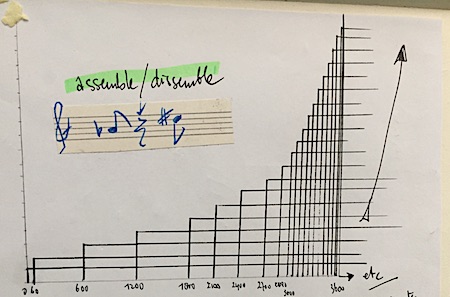
|
The graphic assemble/dissemble score that I drew up for my one hour set during the Antivirus101 Placard, on December 31st, live from La Générale Nord-Est |
I then composed the piling up of the random walks to occur faster and faster, sort of exponentially over the course of an hour (see the picture above), leading from only two layers to about 256 at the end, when they all are moulded together into a vast wall of sound (though still it is not, not yet, what one would properly call (coloured) 'noise'; along with the increasing volume and ever denser sonic pressure figures, notes, isolated sounds, phrases, barks, sirens, words continue to emerge. It is what I like about these particular 'walls'...).
In 'assemble/dissemble' I re-visit the universe of the combined 'gonzo'-recordings that Hal McGee and myself made of our daily doings in the December month of corona year 2020 in a similar way.
Sound Chronicles
Almost 18 years ago, in an online interview back in early cyber days (when the web despite the 'drama' of a recently burst financial bubble was opening up exciting views on a still unexplored realm roamed by pioneers, thrilled by promises and the dream—already soon after proven utterly naive—of a vast utopian free-for-all space of information and exchange where all, from wherever and whoever they were, would, be equal) Chaz Farano talked to me about my lo-fi 'assemblages', composed from the lo-fi 'field' recordings of my daily life that I had been collecting with my pocket cassette recorder and lapel microphone for decades, things I called my Sound Chronicles.
The reason why at some moment (eh ... when again was it?) there came an end to my near to daily 'gonzo' recording on cassette, was the rise of the digital (along with the web) and the mort subite, the 'sudden death', of the analog in sound recording and playback, that made cassette playback and recording technology obsolete and (almost) sink into oblivion. The dictaphones I used started to fail, to fall apart, and it got more and more difficult to replace them. Which then at some point I stopped trying.
And, no, I did not continue the habit in digital form. Because the digital was just... different... also the means and ways that I used for 'audio documenting' my life grew different. Doing so became more incidental, more, say, project wise. Like doing 10 sound-seconds-a-day sound diaries in every year that is prime, of which up to now there have been two editions: a first in 2011 and the second one in 2017. As there will be no next prime year until 2027, it'll take some 6 years before again you will find me with a (digital) recorder ready at all times to 'gonzo' record the sounds around me.
But there's always some exceptions. And excellent excuses to do what one normally does not; or nor any longer, haha.
... 'assemble/dissemble' en est un exemple,
Hal McGee's audio folk art
car indeed it was Hal who had me (temporarily) again audio documenting my day-to-day doings. That was over the December month of the past corona year, as he proposed me to become half against his hal(f) in a December 2020 edition of his ongoing series of dictaphone-audio assemblages, in which, month after month, he layers random collages of 'gonzo' recordings of his daily dwellings and doings in Gainesville, Florida, made with a number small portable digital dictaphones that he carries around with him, the way I used to carry a cassette dictaphone around in the inside pocket of my jacket, with a little microphone on its lapel.
[ Did I ever mention the scary moments when some long ago evening in the Parisian metro I reached in that pocket to turn my dictaphone into recording mode? And that this made the shouting bad guys I was intent on recording think that I was about to pull a gun? ... I did not? Well, then here you go. All part of my 'Art of the K7', haha, 😂 😎 ]
Hal's assemblages are bubbling and gurgling streams of sound in which we are invited to immerge ourselves and drift along with him and his little loud-mouthed & opinionated 'Mexican killer' canine companion Stanley, rafting along rivers of time, never ceasing to comment, philosophise and theorise on those same assemblages while recording the very sounds that are to take part in them...
McGee's collected assemblages form a unique evolving audio document. A 'Great American audio-Novel', as far as I'm concerned. It is mix of aural autobiography, aural history, art theory, facts and fictions, executed in the form of a multilayered random Burroughsian sonic cut-up. Whether a truth is in there, somehow, somewhere as suggested in, say, Gysin's & especially Burroughs' speculative theorising around their early cut-up endeavours, or whether there is not, that is actually not so much the point ( * ).
In McGee's words: "The assemblage is the story." Or, what you hear is what you get.
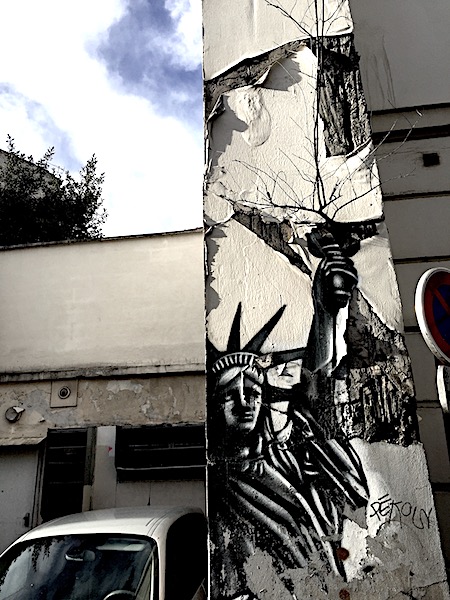
You can read lots that you might want to learn about Hal's project in the long-read interview that Leslie Singer published on the Electronic Cottage web site, and that she named her Joy Project.
Basically, Hal will realise an assemblage by his taking the four (digital) dictaphones that contain a given month's 'gonzo'-recordings, putting each of them in shuffle playback mode, and then recording the result of their simultaneous playback, with little or no additional editing, without effects or whatever other audio-treatment.
Symmetric Groups Sn
Partaking in this undertaking, for starters on the recording and collecting material side, and thinking about it, plunged me right (back) in the midst of the dazzling universe of combinations and permutations, and the combinations and permutations of our dazzling univers. And up on the wobbly speculative bridges that join these two, sort of ... mind poles ...
For illustration's sake, let's assume that in an average month Hal has each of the four dictaphones capture 80 audio snapshots from his daily doings. Then the number of formally different ( $ ) assemblages is 80!4, which, written out with every single one of its 476 digits, amounts to:
26236801526389924624117038873799244103814917755367583529879638036498539489400909422627280216692329005989804769451037664131070810297649979812997002104520658167784448977185440504375351156028677966818269660343910685743512414288787802629362723802780417551947364278256408962103544269403128934888464436261124068088541754612000897212670858546355250414867213859736222151110797978016351808692008513312873512960000000000000000000000000000000000000000000000000000000000000000000000000000
That adds up to about 2.62 x 10475. A number still easy to write down. But it is, for me, for you, for all, impossible to grasp this figure's meaning as a magnitude. It is way beyond any human, any earthly scale. Numbers like these to us can not be but mere abstractions. E.g. the estimated total number of (elementary) particles in our known universe is but a mere 1080.
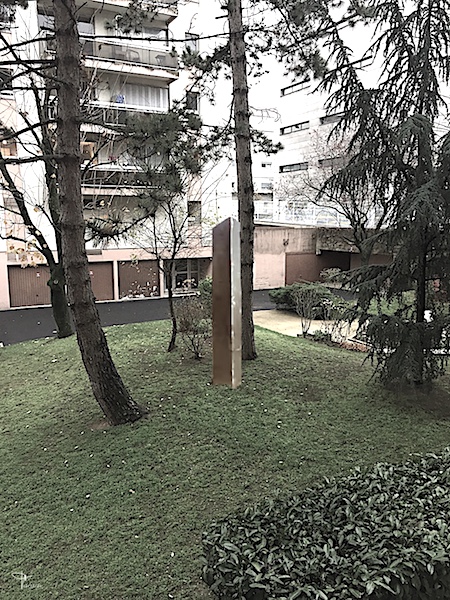
singularity among singularities
Only one among these supra-cosmically many possible playback scripts will unfold itself, second after second, along our, the human, timeline as the result of a four-way shuffle play. Here is what came out of Hal's multi-layered shuffling of the combined set of his and my recordings made over the past December month, and then made it unto his Bandcamp....
I do not know how exactly Hal generated the assemblage, but his December recordings consisted in a 'Dictaphone 1' set with 74 tracks in duration varying from 4 seconds to 86 seconds, and a 'Dictaphone 2' set with 141 tracks in that in duration vary from 1 second to 139 seconds, with a total playing time of about 1 hour and 47 minutes. I recorded all of my December sounds on my Zoom H2, a set of 118 clips, varying between 13 and 127 seconds, with a total playing time of about 2 hours and 5 minutes.
The probability of having precisely this one realised assemblage fall out of some gigantic turning bingo mill that holds the ultra-, supra-cosmically sized set containing them all is, for all practical purposes, equal to naught, nothing, zero, 0. But then, hey, there it is on Bandcamp, this singularity amidst singularities...
This is the sort of lurking alchemical wonder that—very understandably so— is at the base of thoughts and writings of many an artist that this past century thought about and explored the outcomes of chance operations. Here I of course refer to Gysin and Burroughs, but I also think of Stéphane Mallarmé's famous poem Un coup de dés jamais n'abolira le hasard ('A Throw of the Dice will Never Abolish Chance') and, specifically, of Marcel Duchamp, who, talking with Calvin Tomkins, refers to his use of chance operations as a means of expressing—hence accessing—one's subconscious: "If I make a throw of the dice it will never be like your throw—meaning that it's a marvellous expression of your subconscious. And so an action like throwing dice to find the notes of a piece of music was nevertheless a subconscious expression of myself." ( ** ) It is as in Mallarmé's mysterious poem, where the old man's facing the sea. The actual throw of the die does not abolish, it shifts levels from an instance to an instantiation of, chance.
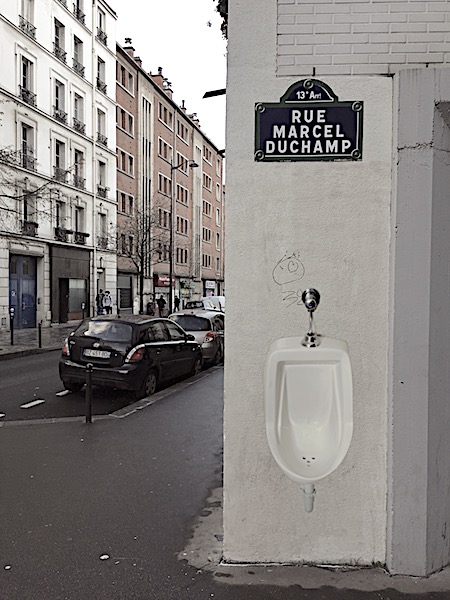
All of this is ground for continuing fascinating speculation ( *** ). Magic, really, grafting as it does 'necessity' on the outcome (in the form of a person's subconscious or [Burroughs] some universal substrate causing the outcome) of an act of 'chance', a word that rings the very opposite of 'necessity'. Anything occurring by 'chance' happens 'un-necessarily', as it also might have happened otherwise.
But is that really so?
Maybe it is not.
Though the outcome of an act of 'chance' is unforeseeable, this does not mean that it is 'un-necessary'. When we cross the temporal gap that separates the before from the after of the act (once the die has been cast) the stone has fallen as it fell.
The outcome is what it is.
It is necessarily so and not other.
Nothing will change that.
It's all about time again. We cannot go back in time. OK, there may be different worlds where things are other. But if now it were any other, this would be a such different world.
But, hey, it is not.
This world is as it is.
We know only our, this world.
Where now can not be other. But does this actually imply that also it could not have been otherwise? That's where is and stays the rub.
"Let's dance on the feet of chance!"
Surely not the first to do so, but quite notably so, in his Also sprach Zarathustra we find Friedrich Nietzsche reflecting on the random and chance that appear to rule our universe, by way of the text's protagonist.
me—« Zarathustra dit que les cieux sont au-dessus de toute raison et au-dessus de tout but, et qu’en fin de compte, l'univers n'est pas dirigé par la raison et le but, mais par le hasard et l'accident ...
C’est très ‘random’ ... Ce qui je trouve surprenant, par contre, c’est que pour moi, l’aléatoire contredit le retour éternel ... car un retour éternel, où tout se répète à l’identique, n’a rien d’aléatoire, non ? »
WeiWei-« Mais ce que j’ai noté, c’est qu’il a dit :
"Je suis Zarathustra, l’impie : je fais bouillir dans ma marmite tout ce qui est hasard. Et ce n’est que lorsque le hasard est cuit à point que je lui souhaite la bienvenue pour en faire ma nourriture." »
me—« C’est trop bien vu ! Haha, mais est-ce qu’il le cuit, le hasard, car il l’aime, ou car il veut le dompter ? »
WeiWei-« Je pense que c’est parce qu’il veut le goûter quand il veut. Le hasard devient donc son propre intention... »
me—« Moi je le lisais aussi un peu dans cette façon, car ça me faisait trop pensé comme on utilise l’aléatoire dans la musique, dans les arts, pour mélanger et trouver des choses, et on les utilise oui ou non, que quand ça plaît ... »
WeiWei-« C’est quand même un hasard sous contrôle 🤔 »
me—« T’as raison ... surtout dans la phrase après : "Et en vérité, maint hasard s’est approché de moi en maître : mais ma volonté lui parle d’une façon plus impérieuse encore, — et aussitôt il se mettait à genoux devant moi en suppliant — "
... soumettre l’aléatoire à sa volonté ... comme un dompteur de lions 😊
Trop bien !»
WeiWei-« 😂 »
_[ III: Vor Sonnen-Aufgang ]
"Über allen Dingen steht der Himmel Zufall [...]" ["above all things stands the random heaven {...}" ]
"Ein wenig Weisheit ist schon möglich, aber die selige Sicherheit fand ich an allen Dingen: daß sie lieber noch auf den Füßen des Zufalls—tanzen." [A little wisdom is indeed possible; but this blessed security have I found in all things, that they prefer—to dance on the feet of chance.]
_[ III: Von der verkleinenden Tugend, 3 ]
"Ich bin Zarathustra, der Gottlose: ich koche mir noch jeden Zufall in meinem Topfe." [I am Zarathustra, the godless: I cook all that's random in my pot.]
_[ III: Auf dem Ölberge ] "Laßt den Zufall zu mir kommen: unschuldig ist er, wie ein Kindlein!" [Let the random come to me: innocent it is, like a little child!]
permutations
we are all combinations
are we all combinations
all we are combinations
we all are combinations
am all we combinations
all are we combinations
all are combinations we
are all combinations we
combinations all are we
all combinations are we
are combinations all we
combinations are all we
combinations we all are
we combinations all are
all combinations we are
combinations all we are
we all combinations are
all we combinations are
are we combinations all
we are combinations all
combinations are we all
are combinations we all
we combinations are all
combinations we are all
All (that) matters, including ourselves, appear(s) to us in the form of combinations of smallest constituents, of divers kind: this text as a combination of words, the words as combination of letters, our library as a sequence of books, our genomes as a combination of base pairs, a molecule as a combination of atoms, an atom as combination of neutrons, protons, electrons, a McGee assemblage as a combination of relatively short 'gonzo' field-recordings, and any digital file as a finite sequence of yeses and noes, of ones and of zeros. And so on and so forth. And in any such finite combination of things, the things can be re-ordered, permuted, into a same-length permutation ... Into a same-kinded thing. Or same-kinded? Well, at the very least it'll be a thing that kept precisely the same constituents.
Unlike in Burroughs' and Gysin's days, current computers and computing power start making it possible to tentatively explore the vast universes formed by all the different permutations of the constituents of sets far larger than the but 4 words phrase that gets systematically shuffled in the above 'permutation poem', set in the style of Gysin's 'permutation poems' from the 1950s, 1960s.
We now can quite literally roam Borgesian libraries, in search of the one or other 0-probability semantic wonder that transcends human time.
As in the online version of Borges' universal library that was created by Jonathan Basil, who has also unlocked for us an universal slideshow, allowing one to contemplate and watch potentially whatever jpeg-image among the 4096266240 (that's about 10961755) possible ones that are 640 pixels wide and 416 pixels high, with each pixel being assigned one of 4096 possible colours.
I regularly let Basil's universal slideshow play in a little window in the upper right corner of my laptop's screen, as a reminder maybe of the futility of it all. All slides are different, but (and I think there's something essential in that simple fact) also they are all the same: images both 'too simple' and 'too complex' for us to meaningfully distinguish between them.
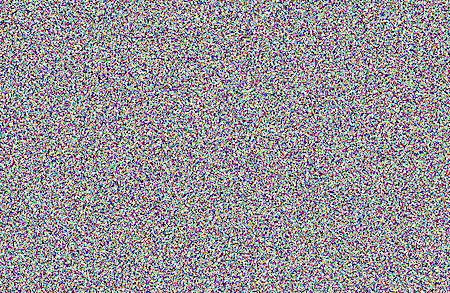
The universal slideshow images are apt illustrations of the beginning of the first page of py,text, which is the title of one of the mega-astronomical many books in Basil's universal library.
Here's the shelf where that book can be found, and below that a glance at its first page:
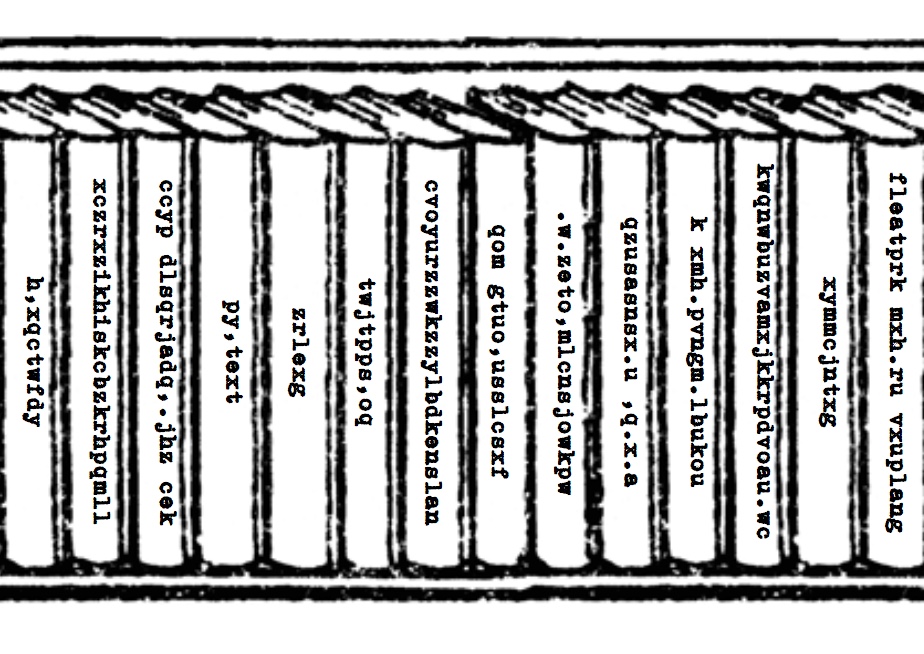
|
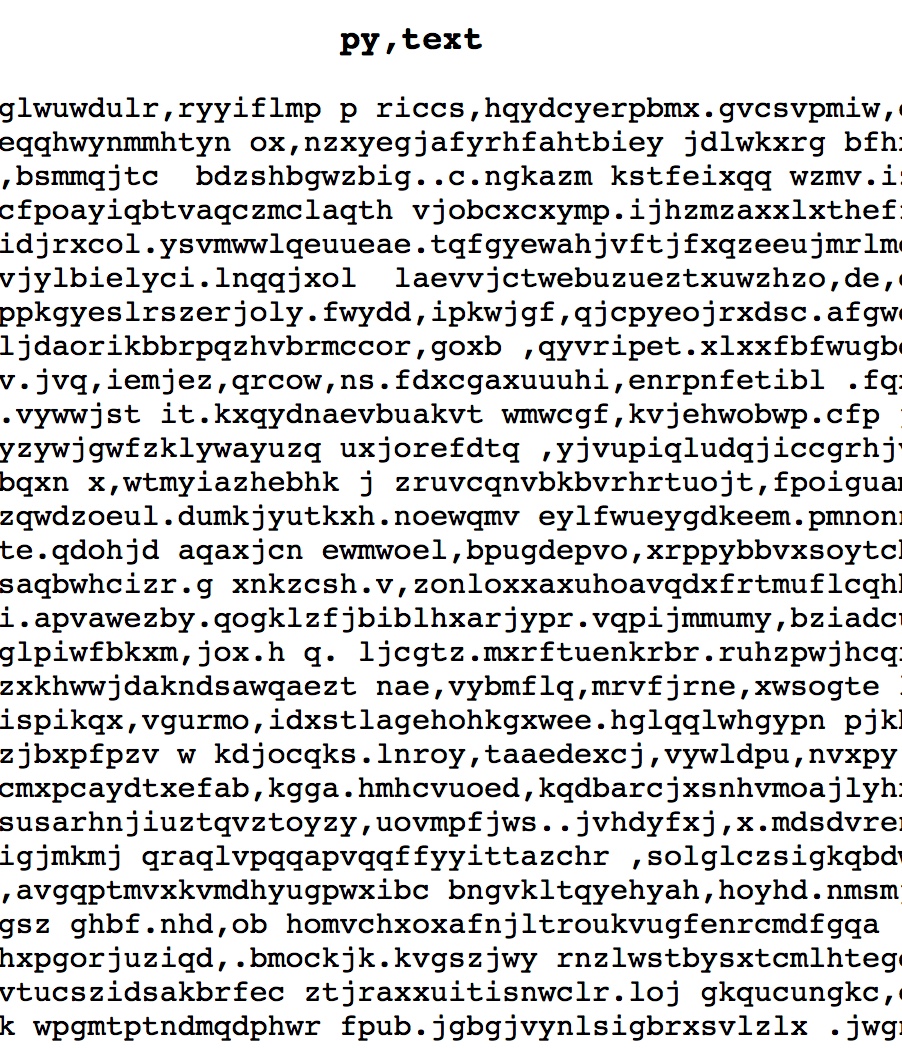
|
...
There is something deeply disturbing that at the same time is near to mystically profound to the thought: it is a simple and trivially obvious fact that any possible past or future expression and/or revelation of beauty, truth, wisdom that is expressible in written language is out there in that universe, up for grabs. Or so it seems. For, [un]fortunately the probability that we will stumble upon any such a 42-ish gem by randomly walking that space is ... nil ... It is not just simply 'very unlikely' that the universal slide show will suddenly confront me with a portrait of my great-great-great-great-great-great-great-grandfather as a young man. It will NOT. Though that very portrait IS...
In the very same spirit and with the very same sort of coding we can generate the universal mp3 playlist, which would include in mp3 format (or any other digital audio form if you'd prefer) any thinkable sound and musical fragment, the sounding voice of every single human that ever lived and ever will live, speaking and singing anything that was or could have been spoken and/or sung, from the moment α that once was in our past on to the ω in the for-ever coming future... It is just that, like with that one magical book page and that single devastating image... we will NEVER, not even by mere chance!, hear it.

Relations
So then, are we not all permutations?

I'd say: "Yes, but also no ... All depends on what it is that you have in mind when you are saying that you're 'combining & permuting'." Here's my speculation, my speculative hypothesis (it's merely— or maybe not really just 'merely'—a version of the ancient wisdom that 'the whole is far more than the sum of its parts'): our universe, at least the senseful one, the one that to us makes sense, is not the _material_ universe consisting in combinations / permutations of elementary particles, letters, strokes, pixels, bits; our senseful universe is a _virtual_ universe, that consists entirely in combinations / permutations of (relations between) meanings."

In the sentence 'we are all permutations', we may choose to relate 'all' to 'permutations', or we may relate it to 'we'. It is like viewing a duck-rabbit image: the meaning of the sentence is ambiguous, it depends on which relation we hear/see. In the sentence's permutation 'we all are permutations' —which is obtaind by only by one swap of words from the firs sentence— only one of the original two relations persists (the one between 'we' and 'all'), and the relation's [arrow's] meaning has drastically changed: from the totality that makes up each individual within the 'we' in the first sentence to the collection of individuals that together are the 'we', in its permutation.)
And here's the rub, yeah, the one fundamental difference between Basilian / Borgesian universes —for texts (as permutations of letters), for images (as permutations of pixels), for sound (as permutations of bits) <---> and the random sonic assemblages, image collages, text cut-ups and so forth that, from the early day (Futurist, Dada, Duchampian, Lettrist, Burroughs, Gysin...) experiments, have evolved into an important and much used tool, not only in all that is art or, say, 'artistic', but in all of this world's domains that are dealing with signs and with symptoms (with 'meaning').
In the assemblages, the permuting and combining makes relations hence meaning appear.
Re-permuting and re-combining shifts relations, shifts meaning; it makes new relations, hence new meanings appear.
However, there are no meaningful relations between the individual letters of our alphabet, abcdefghijklmnopqrstuvwxyz. It is why a random assembly of letters is basically void, it does not generate meaning. It almost never even will result in a more-than-three-letter word that can be found in our dictionaries, let alone a (however small) combination of such words (which always have meaning, even when it may not seem to make sense). For the same reason the random assembly of pixels is void, and more generally a random assembly of bits, 10011101011111100101000111. Do observe however that there are semantic relations between the individual notes of our musical scale: the difference in pitch, the intervals, mean to us (in an abstract way, but they do; they move us, it's something still not quite well understood in our heads). Single musical notes (or, more generally, whatever sounds with duration, cf. Pierre Schaeffer's 'objets sonores') therefore actually are very, very close to words, they are nothing like letters. Which is why 'random' composition generates meaning, abundantly.
The random walk as derive
As a teenager I chanced upon the zig-zaggy drawing of a 'random walk' in the first volume of Feynman's Lectures of Physics, and it is a concept, a notion, that has been exerting its fascination upon me ever since; even though for some unclear reason random walks, random sequences, choice sequences... they never became an 'official' topic in the years of my 'official' academic work.
Collage, chance and cut-up, in any medium, from Marcel Duchamps brief musical speculations, Cage's aleatory scores, Burroughs cut up novels, Gottfried Michael Koenig's PR1 and PR2 scores, my Etude, to Hal McGee's audio folk art dictaphone assemblages, they all are random walks in senseful 'universes', through which they trace paths, random paths of meaning. And yes, this also applies to visual collage, where the re-ordering, through whatever means, by the artist of elements occurs in time (**** )
All of them are derives—'unplanned journeys through a landscape'—in the situationists' sense.
Derives in lands of meanings.
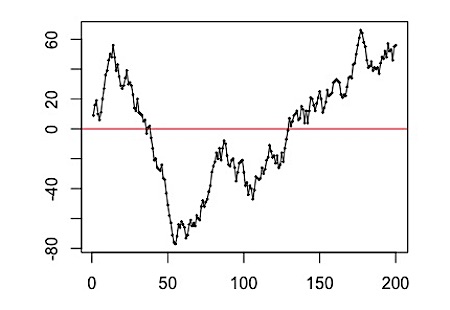
|
A—what I call—'symmetric random-9 walk': step sizes are uniform randomly picked between 1 and 9, a fair coin decides for each step whether it'll be in forward or backward direction |
About the Placard international Headphone Festival on the SoundBlog:
(january 30, 2021) - assemble/dissemble (Antivirus 101 Placard)
(september 14, 2019) - A brief history of Le Placard (1998-...)
(august 11, 2019) - Vive Le Placard ! Varia ...
|→ (august 04, 2012) - 72 Hours of Post-Nuclear Survival
|→ (august 08, 2009) - (Le) CLeUb, Placard, CLeUb
(february 12, 2008) - Karlheinz's Song of Praise
(november 28, 2007) - Placardée l'Agence XP
(november 05, 2006) - Cellarlar Heroes
(october 20, 2006) - Funky Shit!
|→ (august 14, 2006) - placard : la générale
(july 30, 2006) - "le zida ne passera pas par moi..."
(july 07, 2006) - de_'tails of lite house keeping'
|→ (july 27, 2005) - tafelmuziek: placard & cd
(july 31, 2005) - tafelmuziek: paradiso placard
(june 18, 2005) - zandoog placard & cd
(december 31, 2004) - soundinjury placard
(may 31, 2004) - old bears new tricks
(may 13, 2004) - tafelmuziek placard
(july 13, 2003) - gaité lyrique
(june 20, 2003) - live chronicles
notes __ ::
(°) Friedrich Nietschze. Also Sprach Zarathustra, Dritter Teil, Von der verkleinernden Tugend, 3 - "Ich bin Zarathustra, der Gottlose: Ich koche mir noch jeden Zufall in meinem Topfe. Und erst, wenn er da gargekocht ist, heiße ich ihn willkommen, als meine Speise." (French: « Je suis Zarathoustra, l’impie: je fais bouillir dans ma marmite tout ce qui est hasard. Et ce n’est que lorsque le hasard est cuit à point que je lui souhaite la bienvenue pour en faire ma nourriture. ») [
^ ]
(*) William Burroughs. The Electronic Revolution [
^ ]
($) Formally different, indeed. Many of these will hardly appear different to us, being for example obtained from one another by a mere swap of two elements. How many perceptually different, non-equivalent, versions of a such assemblage one could/should distinguish is a fascinating question, to which I do not have an answer. [
^ ]
(**) Calvin Tomkins. Marcel Duchamp. The afternoon Interviews [
^ ]
(***) Also for instance in Quentin Meillassoux' quest of cracking the number code of Mallarmé's poem. In Le Nombre et la Sirène. (Fayuard, 2011). There is an Enlish translation by Robin MacKay, The Number and the Siren (Sequence Press, 2012). [
^ ]
(****) [A creative act always is sequential, it takes place in time] [
^ ]
tags: random, derive
# .502.